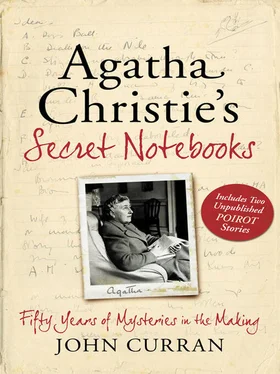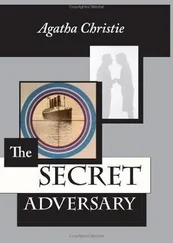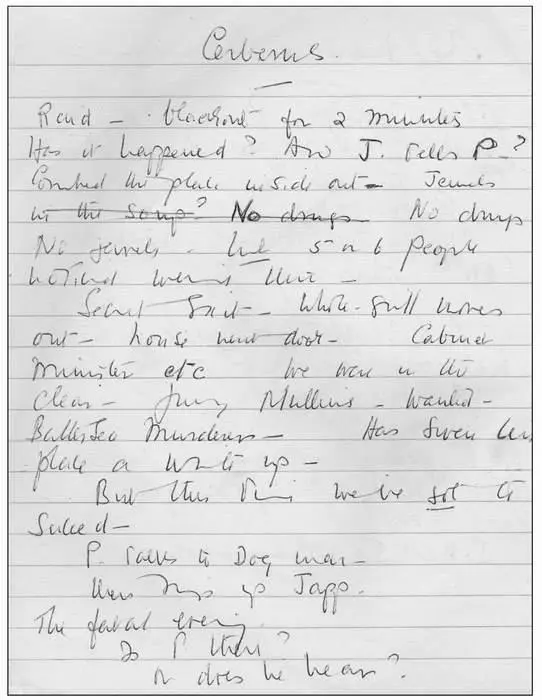
Two pages showing the two sets of notes for ‘The Capture of Cerberus’. The left-hand page (Notebook 44) refers to the version published in The Labours of Hercules, and the right-hand page (Notebook 62)…
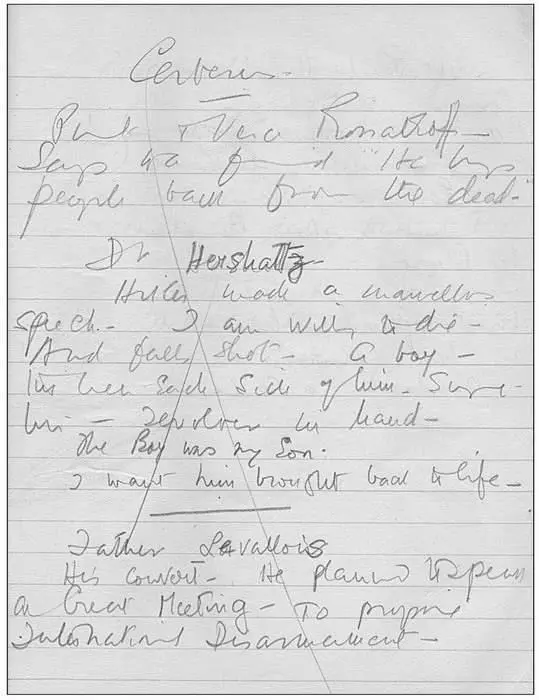
…to the newly-discovered earlier version included in the Appendix. Note the difference in handwriting over the almost 10-year period.
In an interview for her Italian publishers, Mondadori, conducted soon after the publication of Passenger to Frankfurt in 1970, she writes, ‘I have never been in the least interested in politics.’ So why did she not simply tone down the portrait and change the name? Ironically, Chapter 17 of that novel contains more than a passing reference to the main idea of the short story. Is it possible that, 30 years after it had been rejected, Agatha Christie unearthed her idea and inserted it into a very different book? And that, long after The Strand had ceased publication, she had the last laugh?
‘The Capture of Cerberus’ (unpublished version) in the Notebooks
There are notes to the unpublished version of the story in Notebooks 44 and 62:
Cerberus
Does Poirot go to look for 2 friends supposedly dead
Lenin Trotsky Stalin
George II Queen Anno
Must go unarmed (like Max Carrados in room story)
Poirot and Vera Rossakoff—says to a friend—‘he brings people back from the dead’
Dr Hershaltz
Hitler made a marvellous speech—I am willing to die— and falls shot—a boy. Two men each side of him—surprise him—revolver in hand. The boy was my son—I want him brought back to life.
Father Lavallois—his convert—he planned to speak—a great meeting—to propose International Disarmament. Dr Karl Hansberg—compiles stastistics—letter of introduction from…medical authorities in Berlin—doctor in charge lured away by religion—nurse tries to prevent him. Herr Hitler—hands him a card.
While the similarities to Hitler are quite clear in the story, there is no mention of the actual name—until we read Notebook 62. But the ‘hands him a card’ at the end is mystifying; and some of the other references are equally mysterious. If, as is almost certain, this was written in 1939 why are Lenin, Trotsky and Stalin listed? Lenin died in 1924 but Trotsky lived until 1940 and Stalin until 1953; and the other two historical figures were long dead. Moreover, none of them could be considered friends. All the names are crossed out in Notebook 44 but their presence at all is inexplicable. The Max Carrados reference is to the detective created by Ernest Bramah and the story ‘The Game Played in the Dark’; this character and story had already been pastiched in the Tommy and Tuppence collection Partners in Crime, where Tommy emulates the blind detective in the story ‘Blindman’s Buff’.
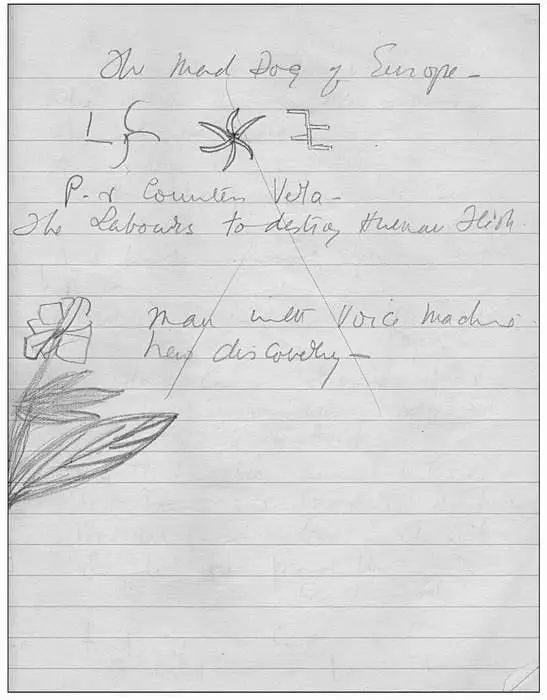
This page from Notebook 62, during the original plotting of ‘The Capture of Cerberus’ (despite the reference to ‘destroy human flesh’ and its echo of ‘The Horses of Diomedes’), may represent Christie’s doodles of a variation on the Swastika.
The Capture of Cerberus (The Labours of Hercules XII)
i
Hercule Poirot sipped his apéritif and looked out across the Lake of Geneva. [2] Unlike the collected version, which is set unequivocally in London, the previously unpublished version has, like many other Labours, an international flavour. From the first sentence we are ‘abroad’ and, for the third time in the Labours, in Switzerland (perhaps significantly a neutral country). Poirot has already visited the country during ‘The Arcadian Deer’ and ‘The Erymanthian Boar’.
He sighed.
He had spent his morning talking to certain diplomatic personages, all in a state of high agitation, and he was tired. For he had been unable to offer them any comfort in their difficulties.
The world was in a very disturbed state—every nation alert and tense. At any minute the blow might fall—and Europe once more be plunged into war.
Hercule Poirot sighed. He remembered 1914 only too well. He had no illusions about war. It settled nothing. The peace it brought in its wake was usually only the peace of exhaustion—not a constructive peace.
He thought sadly to himself:
‘If only a man could arise who would set enthusiasm for peace flaming through the world—as men have aroused enthusiasm for victory and conquest by force.’
Then he reflected, with Latin commonsense, that these ideas of his were unprofitable. They accomplished nothing. To arouse enthusiasm was not his gift and never had been. Brains, he thought with his usual lack of modesty, were his speciality. And men with great brains were seldom great leaders or great orators. Possibly because they were too astute to be taken in by themselves.
‘Ah well, one must be a philosopher,’ said Hercule Poirot to himself. ‘The deluge, it has not yet arrived. In the meantime this apéritif is good, the sun shines, the Lake is blue, and the orchestra plays not badly. Is that not enough?’
But he felt that it was not. He thought with a sudden smile:
‘There is one little thing needed to complete the harmony of the passing moment. A woman. Une femme du monde—chic, well-dressed, sympathetic, spirituelle!’ [3] A most unlikely and almost unique thought for Poirot!
There were many beautiful and well-dressed women round him, but to Hercule Poirot they were subtly unsatisfactory. He demanded more ample curves, a richer and more flamboyant appeal.
And even as his eyes roamed in dissatisfaction round the terrace, he saw what he had been hoping to see. A woman at a table nearby, a woman so full of flamboyant form, her luxuriant henna-red hair crowned by a small round of black to which was attached a positive platoon of brilliantly feathered little birds.
The woman turned her head, her eyes rested casually on Poirot, then opened—her vivid scarlet mouth opened too. She rose to her feet, ignoring her companion at the table, and with all the impulsiveness of her Russian nature, she surged towards Hercule Poirot—a galleon in full sail. Her hands were outstretched, her rich voice boomed out.
‘Ah, but it is! It is! Mon cher Hercule Poirot! After how many years—how many years—we will not say how many! It is unlucky.’
Poirot rose to his feet, he bent his head gallantly over the Countess Vera Rossakoff’s hand. It is the misfortune of small precise men to hanker after large and flamboyant women. Poirot had never been able to rid himself of the fatal fascination the Countess had for him. Now, it was true, the Countess was far from young. Her makeup resembled a sunset, her eyelashes dripped with mascara. The original woman underneath the makeup had long been hidden from sight. Nevertheless, to Hercule Poirot, she still represented the sumptuous, the alluring. The bourgeois in him was thrilled by the aristocrat. The old fascination stole over him. He remembered the adroit way in which she had stolen jewellery on the occasion of their first meeting, and the magnificent aplomb with which she had admitted the fact when taxed with it. [4] This is a reference to the first meeting of Vera Rossakoff and Poirot in ‘The Double Clue’, published in December 1923, when he unmasked her as a jewel thief. They subsequently met four years later in The Big Four.
Читать дальше
Конец ознакомительного отрывка
Купить книгу
